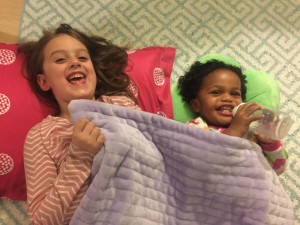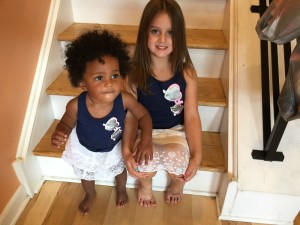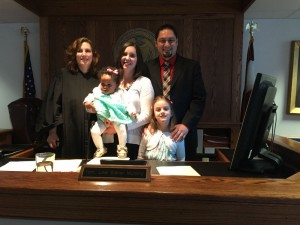When Should You Tell Your Kids They’re Adopted?
We live in a culture in which “you’re adopted” is somehow still viewed as an acceptable insult, regardless of whether or not the person it’s being said to was actually adopted. While in reality, being adopted is a good thing and something to be proud of. The implication in these cases is that the people on the receiving end of this taunt are oddball characters so disturbed that they must have originated (and subsequently been unloved and rejected) from the bloodline of some family other than the one in which they were raised. According to this insult, being adopted means you don’t really belong. Additionally, some movies and TV shows have featured older kids discovering—often through awkward or heart-shattering means—that they’re adopted (i.e. not a “real” member of their family) and are forced to face their identity fallout alone as they question everything they ever thought to be true.
Enter reality. This is not what the vast majority of adoptee identities are or how they should be portrayed.
Until we eradicate any remaining notion that adoption should carry with it even an ounce of shame or secrecy, the stigmas will continue. It’s vital, for our children’s sake, that we not only embrace their identity but teach them to do the same. And that starts by talking to them about their adoption when they’re at an early age. How early? Well, that’s up to every parent to decide, but I’d strongly argue it would be wise to begin as soon as they’re recognizing faces. If you know the name of your child’s birth parent(s), share it (as long as it’s appropriate to do so in your situation). If you have any pictures of them, show them (again, if appropriate). Enable your kid to put the name(s) with the face(s). You’ll obviously need to tailor the scope of these adoption info moments to the different stages of your child’s cognitive development, but the most important thing is that you’re consistently sharing. Keep in mind, this is your child’s identity, not yours. They have every right to all the information you have to give.

Telling your children about their adoption will not cause them to reject you. This is a myth that sounds good in fiction (actually, not really) but doesn’t translate to real life. Instead, your children will quickly gain your trust and learn you’re someone who will always be honest with them about the most important details of their lives. When your children inevitably face their own identity questions, the foundation you’ve built with them early on will be the bedrock of support they’ll need as they process their unique place in the world.
In full disclosure, I was fearful before my wife, Tara, and I adopted our two children. I memorized the patterns of my bedroom ceiling, wondering if I’d ever truly be attached to a child not comprised of my own DNA or if an adopted child would reject me as not his or her “real father.” I felt the ongoing sting of our infertility and the concern that my future child wouldn’t be fully accepted by my extended family. But through my interactions with men and women who’d adopted and the counsel and advice of our social workers, I learned all these fears and hesitations were completely normal. Just as important, I confronted the shame I’d been feeling, a sentiment I did not want to pass onto my future children.
Until our first child, Kaylin, came home, Tara and I hadn’t thought much about how and when we’d tell our future kids about their adoption. But as we lay our two-day-old baby girl down to sleep for the first time, all we could do was tearfully gush to her about how loved she was by not only us, but by her birth mother who’d chosen to give her life and hand-picked us to be her mommy and daddy. After that first day, talking to Kaylin about adoption felt as natural as breathing, and the practice only continued when we adopted our second child, Julia, a few years later.

People often ask me if Kaylin and Julia know about their adoptions. I usually respond with a question—when didn’t they know about their adoptions? For Tara and I, talking to our daughters about their adoption stories is as normal as any parent talking to their kids about eye color or the shape of the moon. We talked to them about it when they were born. We talked to them about it when they were learning to walk and talk. We showed them pictures of their birth mothers and explained how they grew within the bellies of these great women. And we continue to explain to them how much we love them and how eternally grateful we are to have become their parents.
So, tell your kids early. Tell them often. And tell them exactly how and why their story is beautiful. Their adoption is a normal part of who they are and is worth celebrating at all times.








